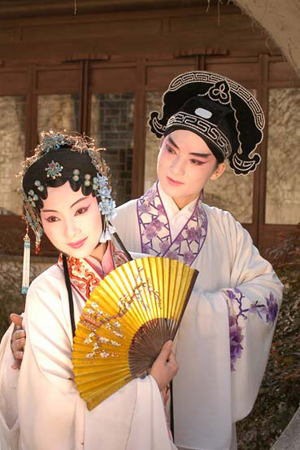| Tools: Save | Print | " target="_blank" class="style1">E-mail | Most Read |
| Home of Kunqu Opera Considers Regs to Protect the Future |
| Adjust font size: |
|
Kunqu, one of the oldest genres of opera in the world, will be protected by regulation in Suzhou, where the delicate art form originated more than 500 years ago. The regulation will be the first of its kind made by a local government aiming to preserve a special kind of intangible cultural heritage in China. A draft regulation is awaiting approval from the city's legislature and is expected to be enacted by the end of this year. To retain the originality of the century-old opera, Suzhou's regulations will protect the performing art of Kunqu, the stage arrangement, Kunqu's unique singing skills, and objects relating to the performance of Kunqu, including costumes, musical instruments, props, important literature and localities. The regulations also define the city government's responsibility to promote Kunqu in schools and universities, so as to cultivate a new generation of Kunqu audience. Basic knowledge about the opera will be taught in elementary and secondary schools, while art schools and universities will open classes for young Kunqu fans. In addition, the government is obliged to develop a favorable environment for Kunqu's revival by setting up special funds, arranging performances, and hosting cultural exchange activities for the opera. Dubbed as "the mother of 100 operas," Kunqu is known for its superb artistry. It is performed in the local dialect of Kunshan of Suzhou City in eastern China Jiangsu Province and was especially favored by nobles in the Qing Dynasty (1644-1911). However, the opera has been in decline in the 20th century, when China was jolted by the Japanese invasion and domestic war. In 2001, Kunqu opera was listed a "masterpiece of oral and intangible heritage of humanity" by the United Nations Educational, Scientific and Cultural Organization. The Chinese government initiated a program to rescue and rejuvenate Kunqu in 2005, planning to allocate 10 million yuan (US$1.25 million) a year to eight major Kunqu troupes in China from 2005 to 2009.
(Xinhua News Agency July 17, 2006) |
| Tools: Save | Print | " target="_blank" class="style1">E-mail | Most Read |
 |
| Related Stories |

